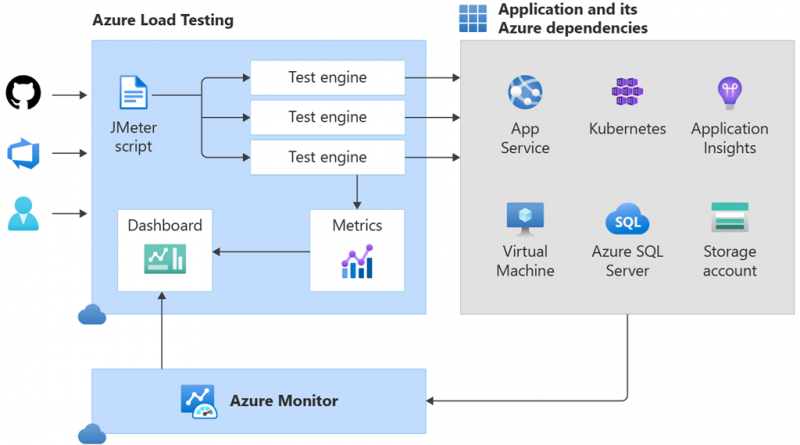Introducing Azure Load Testing: Optimize app performance at scale
Today, we are announcing the preview of Azure Load Testing. Azure Load Testing is a fully managed Azure service that enables developers and testers to generate high-scale load with custom Apache JMeter scripts and gain actionable insights to catch and fix performance bottlenecks at scale.
Application performance and resiliency are more important than ever before. As more businesses and services move toward digitization, the impact of outages and downtimes in lost revenue and customer dissatisfaction grows. Azure Load Testing is a service that can help testers and developers who are taking on a larger role in validating app quality, performance, and scalability.
Creating and managing the infrastructure required for load testing at scale can be time-consuming and complex. With Azure Load Testing, you can generate high-scale load without the need to manage complex infrastructure, and we have included Azure-specific integrations and insights so you can optimize your Azure application at scale.
You can get started with Azure Load Testing with this Quickstart that walks you through how to create and run your first load test.
Figure 1: Azure Load Testing architecture overview.
Learn how your application behaves under stress
Performance problems often remain undetected until an application is under load. We want to help development teams gain insight into how their application behaves under stress. You can start a high-scale load test in the Azure portal and see live updates of the client and server-side metrics while the test is running.
Azure-specific insights can help you understand how different load scenarios impact all the parts of your application, and you can compare test results across different load tests to understand behavior changes over time.
Azure Load Testing integrates with Azure Monitor, including Application insights and Container insights, to capture details from the Azure services. Depending on the type of service, different metrics are available. For example, the number of database reads, the type of HTTP responses, or container resource consumption. Both client-side and server-side metrics are available in the Azure Load Testing dashboard.
Figure 2: Get your performance insights across client and server with the Load Testing dashboard.
Build load testing into your CI/CD pipeline
Azure Load Testing is designed to help you integrate load testing into your continuous integration and continuous delivery (CI/CD) workflows so you can find performance issues before they happen in production. Using the integrations with GitHub Actions and Azure Pipelines you can establish a performance baseline and set clear pass or fail criteria to catch performance regressions on every build.
Azure Load Testing will automatically abort an automated load test in response to specific error conditions. This behavior helps protect against failing tests further incurring costs, for example, because of an incorrectly configured endpoint URL, and is especially important for enabling automated testing.
Getting started with Azure Load Testing
You can get started with Azure Load Testing by creating an Azure Load Testing resource in the Azure portal. Check out the preview documentation and create your first load test.
Learn more about pricing details on our Azure Load Testing pricing page.
We’d love to hear from you through our feedback forum.
Source: Azure Blog Feed


